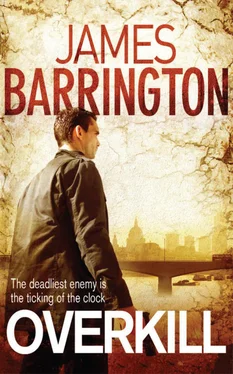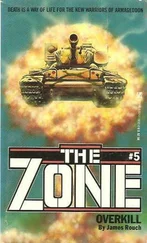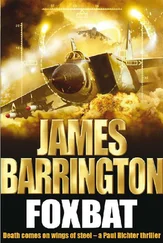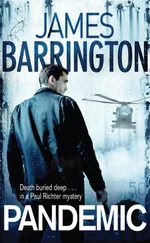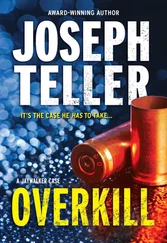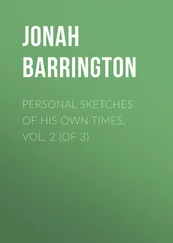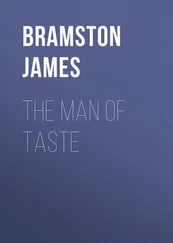Richter didn’t think the occupants of the limousine would want to abandon their car and head off on foot into rural France, but he wasn’t going to take a chance on it. He stopped about ten metres short of the car and directly behind it. Richter could clearly see the faces of the two men in the back seat looking at him, and at the Smith and Wesson he was pointing at them. He heard running footsteps and glanced to his left. Two of the GIGN snipers were approaching. Richter waved one to his left and the other to the right; they stopped in line with him, crouched and sighted their rifles at the Mercedes, covering both sets of doors.
‘It’s over,’ Richter shouted in Russian at the car, reinforcing his words with gestures. ‘Open the doors and step out. Left rear seat passenger first.’
‘That’s it,’ Modin said.
‘What? We just give up?’
‘Viktor,’ Modin snapped. ‘Use your eyes, and then use your head. We’re outnumbered and out-gunned. If we fight, we die.’ He nodded to Bykov. ‘Get out,’ he said. ‘And Viktor,’ he added, ‘try not to do anything stupid.’
Modin leaned forward to the driver. ‘Switch off the engine,’ he said.
Richter saw the movement and turned towards the sniper on his right, but the trooper was way ahead. His rifle cracked twice and both right-hand tyres blew. The Mercedes was going nowhere. ‘The next ones go into the fuel tank,’ Richter shouted. ‘Get out now.’
The left-hand rear door opened, and the passenger slowly emerged, his arms held high above his head. ‘Walk towards me,’ Richter commanded. When he reached about five metres away Richter shouted again. ‘Stop. Lie down, face down, hands and feet apart.’ The Russian hesitated. Richter raised the Smith and Wesson and Viktor Bykov looked straight down the barrel. ‘Your choice,’ Richter said. ‘You’ll lie down, alive or dead.’ Bykov lay down.
Richter followed the same routine, straight out of an American police basic training manual, with the second passenger, and finally the driver and escort. While Richter ensured the co-operation of the prisoners with the intimidating presence of the Smith and Wesson, one of the GIGN snipers lashed their hands together, behind their backs. No rope, no wire, just cheap plastic cable ties. Virtually unbreakable, and no keys to lose.
Richter tucked the Smith back in the shoulder rig, left the four Russians lying in the road and trotted back to the Renault van. Lacomte met him halfway there. ‘The limousine OK?’ he asked.
‘Yes,’ Richter said. ‘Any problems with the lorry?’
‘No. The cab crew got a good dose of CS gas, and came down without any trouble. Both of them have lacerations of the head and neck caused by flying glass, but nothing serious. Our problem is the two Mercedes.’
‘What happened?’
‘They stopped when the lorry started the blocking manoeuvre, but Erulin thought they might try and make a run for it, so his men shot out the tyres.’ The GIGN snipers seemed to be getting quite good at that.
‘And?’
‘The occupants of one of them opened fire, so the Gigènes fired a few rounds through the windows which stopped them. We don’t know whether they’re dead or alive inside the car, but at least they’re not still shooting. The second car is just sitting there. The men inside have weapons available – we can see them through the windows – but they aren’t using them, and neither do they seem to want to come out peacefully.’
Richter thought for a moment. ‘Leave it to me,’ he said. ‘Tell Colin and Erulin not to take any action yet.’ He turned back towards the limousine.
‘Where are you going?’ Lacomte asked.
‘To consult a higher authority,’ Richter said. He walked past the GIGN guards and knelt down beside the older of the two men lying on the tarmac. ‘Are you the senior officer?’ Richter asked him, in Russian. Nicolai Modin nodded. ‘Right,’ Richter said. ‘Let me help you up.’ Richter got Modin to his feet and walked him back towards the limousine.
‘We have a problem,’ Richter said, and pointed up the autoroute. ‘Both your escort vehicles are sitting immobilized about half a mile up the road, full of Spetsnaz soldiers armed to the teeth and surrounded by our men, also armed to the teeth. There’s already been an exchange of gunfire and I guess some of your men will need medical attention quickly.
‘Now,’ Richter continued, ‘we can do this the hard way, or we can do this the easy way. The hard way is they stay in the cars, and we pop an armour-piercing round through each window and follow it with a grenade. That makes a mess on the road and means I’ve got a lot of boring forms to fill in.’
‘And the easy way?’ Modin spoke for the first time, and in English.
‘The easy way is you get on the radio—’ Richter pointed through the window of the limousine ‘—and tell them to leave their weapons in the cars and get out, one at a time.’
‘And then?’ the Russian asked.
‘And then we have a little talk,’ Richter said. ‘If your men surrender I can guarantee they won’t be harmed.’
‘Do I have much of a choice?’
‘Frankly, no.’
‘Can you release me?’ Modin asked.
‘I’d rather not,’ Richter said. ‘Not just yet. I’ll operate the radio for you. My Russian,’ he added, ‘isn’t fluent, but I promise you I’ll know if you say anything you shouldn’t.’
Wednesday
Autoroute A26, vicinity of Couvron-et-Aumencourt
By five they had the situation sorted out. Two Spetsnaz troopers had been found dead when Dekker’s men opened the rear doors of the Mercedes; the other two occupants had serious wounds and were on their way to hospital. The two lorries that had been used for blocking the carriageway had gone, as had the tractor unit from the Russian artic. A new tractor, summoned by Lacomte, had been hitched to the Russian trailer and driven into the next rest area, a few kilometres further up the autoroute. The Mercedes cars had been winched on to breakdown trucks and were parked in the same rest area, awaiting new tyres. Both carriageways of the autoroute were closed to all traffic between the Chambry and Courbes junctions, and were going to stay that way until everyone was ready to leave. The Minister of the Interior was expected imminently, by helicopter, to inspect the cargo in the Russian lorry.
The surviving Russians, with two exceptions, were sitting with their wrists bound with cable ties and locked in the back of Erulin’s Renault van. The first exception was the senior officer who had ordered the Spetsnaz personnel to surrender without a fight. He was sitting comfortably enough at a stone picnic table, thoughtfully provided by the French autoroute operating company, and eating one of the sandwiches left over from Colin Dekker’s lunch. Trooper Smith was standing ten feet away, watching him carefully, his Hockler at the ready.
Richter was sitting in the back of the Transit van, looking at the second exception – the younger of the two Russian passengers they had pulled from the back seat of the limousine. ‘My name is Beatty,’ Richter said, ‘and I represent the British government.’ A somewhat sweeping, and almost entirely inaccurate, statement, but there was nobody around who could dispute it. ‘Can I please have your name?’ Richter asked politely.
The Russian stared at him. ‘You have seized my passport,’ he said. ‘If you can read, you will see that it is a diplomatic passport, and that by holding me you are in breach of international regulations. I have nothing further to add.’ He turned to look out of the window.
Richter picked up the passport and glanced at it. ‘According to this document,’ he began, ‘your name is Petr Lavrov and it states that you are a diplomat. I do not believe either of those pieces of information. I do not believe that your name is Petr Lavrov, because I heard your superior address you as “Bykov”. And I do not believe that you are a diplomat because real diplomats do not attempt to smuggle nuclear weapons into another country.
Читать дальше
